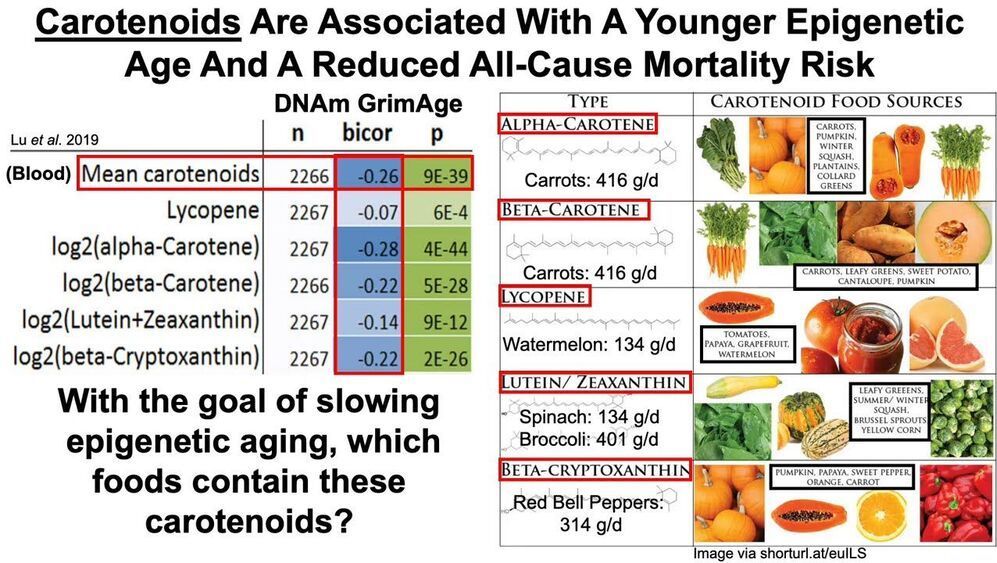Mar 14, 2021
Carotenoids Are Associated With A Younger Epigenetic Age And Reduced All-Cause Mortality Risk
Posted by Mike Lustgarten in categories: biotech/medical, genetics, life extension
Here’s my latest video!
Papers referenced in the video:

Here’s my latest video!
Papers referenced in the video:
Check out “How Watson Works here.”
Is it possible to live forever by using narrow AI that can perform faster and smarter than humans? Having a doctor give you the correct diagnosis and treatment plan only happens on average, 54% of the time, as the New England Journal of Medicine has pointed out. Having Watson instantly diagnose you with the correct diagnosis and treatment plan 95% of the time will become the new standard. Our crop of new personal medicine products such as continual internal diagnostics, synthetic immune systems, virtual assistants, and regenerative medicine will diagnose and stop sickness from ever occurring while constantly rebuilding and improving body and mind capabilities.
IBM has made a series of Watson computer systems so that any company can raise their industries products and services far beyond our human capability. IBM’s Watson was first featured to the public with its historic Jeopardy win over Ken Jennings and Brad Rutter the best human Jeopardy players. At the time, Watson contained 200 million pages of structured and unstructured content in a ninety server computing system with an analytical software IBM designed called DeepQA. Now, the financial markets, medicine, insurance companies, government, engineering, and customer service call centers are employing (buying) Watson is an artificial intelligence system, that can be specifically tailored to any digitized industry and quickly evolve their industries potential.
Summary: It’s not only our genetics and environment that play a role in aging and longevity, it’s also the random, tiny changes that arise on the cellular level.
Source: USC
A new model of aging takes into account not only genetics and environmental exposures but also the tiny changes that randomly arise at the cellular level.
Most cancers are driven by continuous cell division, the cause of which is largely a mystery. Scientists at Vanderbilt University have discovered a genetic switch that seems to touch off that abnormal proliferation of cells—and they did it with the gene editing system CRISPR.
Using a genomewide CRISPR screen, the Vanderbilt team discovered that deleting a protein made by the gene TRAF3 causes cells to proliferate without stopping, even after they reach a certain density that would normally signal them to stop dividing. Because TRAF3 has not been linked to cancer before, the finding could offer key insights into the development of some cancers, the researchers reported in the journal eLife.
The team started with 40 million epithelial cells, using CRISPR to select cells that kept dividing uncontrollably. They were surprised to discover that a loss of TRAF3 activates signaling that in turn drives cell proliferation. TRAF3 normally activates immunity and had not been linked to uncontrolled cell growth before, they said.
As the world fights the SARS-CoV-2 virus causing the COVID-19 pandemic, another group of dangerous pathogens looms in the background. The threat of antibiotic-resistant bacteria has been growing for years and appears to be getting worse. If COVID-19 taught us one thing, it’s that governments should be prepared for more global public health crises, and that includes finding new ways to combat rogue bacteria that are becoming resistant to commonly used drugs.
In contrast to the current pandemic, viruses may be be the heroes of the next epidemic rather than the villains. Scientists have shown that viruses could be great weapons against bacteria that are resistant to antibiotics.
I am a biotechnology and policy expert focused on understanding how personal genetic and biological information can improve human health. Every person interacts intimately with a unique assortment of viruses and bacteria, and by deciphering these complex relationships we can better treat infectious diseases caused by antibiotic-resistant bacteria.
In the new study, researchers instead aimed to reduce the amount of Nav1.7 that cells make in the first place. Bioengineer Ana Moreno and her colleagues at the University of California, San Diego, modified the “molecular scissors” of the gene editor CRISPR. Changes to the cutting enzyme Cas9 caused it to bind to DNA that makes Nav1.7 without slicing it, effectively preventing the Nav1.7 protein from being made. The researchers enhanced this silencing effect by hitching Cas9 to a repressor, another protein that inhibits gene expression.
The researchers tested the Cas9 approach—and a similar approach using another gene-editing protein known as a zinc finger—in mice given the chemotherapy drug paclitaxel, which can cause chronic nerve pain in cancer patients. The team measured pain by poking the animals’ paws with a thin nylon filament. Paclitaxel prompted mice to withdraw from gentler pokes, indicating that a normally nonpainful stimulus had become painful. But 1 month after an injection of the gene-silencing treatment into their spinal fluid, rodents responded much like mice that had never gotten paclitaxel, whereas untreated rodents remained hypersensitive, the team reports today in.
The approach could also prevent pain when given before paw injections of either the inflammation-causing compound carrageenan or a molecule called BzATP that increases pain sensitivity. And treated mice behaved no differently from untreated ones when their opposite paw—not inflamed by carrageenan—was exposed to a hot surface. That’s an encouraging initial sign that the injection didn’t silence Nav1.7 so completely that it creates a dangerous numbness to all pain, Moreno says. Behavioral tests so far haven’t turned up evidence of potentially concerning side effects; the injections didn’t appear to alter the animals’ movement, cognition, or anxiety levels.

Rapamycin is the drug used to suppress the immune system after organ transplants, but in reduced doses, it appears it may have other health benefits and as such is discussed considerably in the longevity community, and taken regularly my some very famous proponents.
So I thought I would give you some background, alongside the pros and cons, to see what all the fuss is about…
Envisioning an animal-free drug supply, scientists have — for the first time — reprogrammed a common bacterium to make a designer polysaccharide molecule used in pharmaceuticals and nutraceuticals. Published on March 22021, in Nature Communications, the researchers modified E. coli to produce chondroitin sulfate, a drug best known as a dietary supplement to treat arthritis that is currently sourced from cow trachea.
Genetically engineered E. coli is used to make a long list of medicinal proteins, but it took years to coax the bacteria into producing even the simplest in this class of linked sugar molecules — called sulfated glycosaminoglycans — that are often used as drugs and nutraceuticals…
“It’s a challenge to engineer E. coli to produce these molecules, and we had to make many changes and balance those changes so that the bacteria will grow well,” said Mattheos Koffas, lead researcher and a professor of chemical and biological engineering at Rensselaer Polytechnic Institute. “But this work shows that it is possible to produce these polysaccharides using E. coli in animal-free fashion, and the procedure can be extended to produce other sulfated glycosaminoglycans.”
While these tools will enable our society to reopen (and stay open) by improving detection of the virus, CRISPR will also have an important effect on the way we treat other diseases. In 2021, we will see increased use of CRISPR-Cas enzymes to underpin a new generation of cost-effective, individualised therapies. With CRISPR enzymes, we can cut DNA at precise locations, using specifically designed proteins, and insert or delete pieces of DNA to correct mutations.
As we deepen our understanding of the human genome and genetic disorders, patients with previously intractable diseases, such as sickle-cell disease and cancer, will benefit more widely from CRISPR-based therapies that are rapidly moving from the lab to the clinic. In 2019, sickle-cell patient Victoria Gray, for example, became one of the first patients in the world to receive CRISPR therapy for her genetic disease. She has already seen significant improvements to her health, including reduced pain and less frequent need for blood transfusions.
CRISPR will also allow us to act more boldly in the face of other important, interconnected issues such as food security, environmental sustainability and social inequality. The technology will help us grow more nutritious and robust crops, establish “gene drives” to control the spread of other infectious diseases such as Zika, and develop cleaner energy sources such as algae-based biofuels.
Researchers affiliated with Nvidia and Harvard today detailed AtacWorks, a machine learning toolkit designed to bring down the cost and time needed for rare and single-cell experiments. In a study published in the journal Nature Communications, the coauthors showed that AtacWorks can run analyses on a whole genome in just half an hour compared with the multiple hours traditional methods take.
Most cells in the body carry around a complete copy of a person’s DNA, with billions of base pairs crammed into the nucleus. But an individual cell pulls out only the subsection of genetic components that it needs to function, with cell types like liver, blood, or skin cells using different genes. The regions of DNA that determine a cell’s function are easily accessible, more or less, while the rest are shielded around proteins.
AtacWorks, which is available from Nvidia’s NGC hub of GPU-optimized software, works with ATAC-seq, a method for finding open areas in the genome in cells pioneered by Harvard professor Jason Buenrostro, one of the paper’s coauthors. ATAC-seq measures the intensity of a signal at every spot on the genome. Peaks in the signal correspond to regions with DNA such that the fewer cells available, the noisier the data appears, making it difficult to identify which areas of the DNA are accessible.